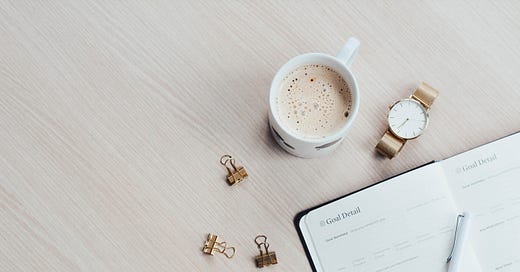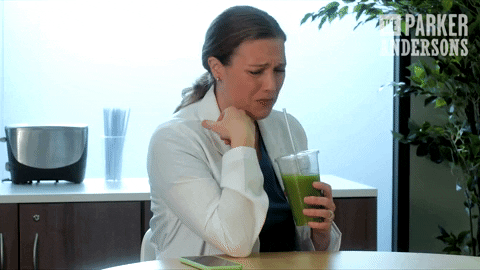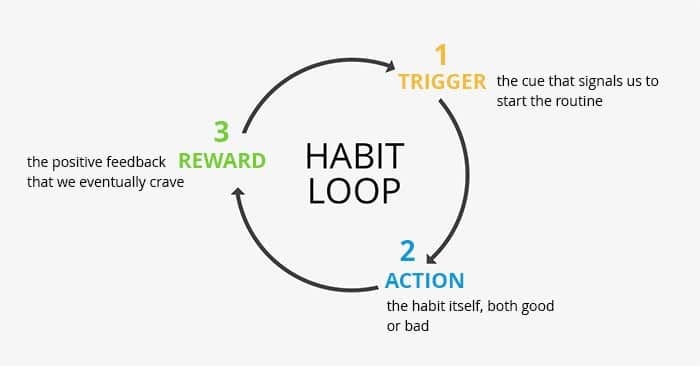Habit Formation: Setting Yourself Up For Success
Essential principles for habit formation, execution and success this year
Habits form the foundation of our lives.
If you want to find out who you are as a person, make a list of your habits.
No, not just the conscious ones you kind-of follow on a good day. I mean the conscious and ‘unconscious’ habits that you carry out on a day-to-day basis.
I put ‘unconscious’ in quotation marks as many of us incorrectly assume our actions and behaviours are at the mercy of our unconscious mind. You need to think of your habits as semi-automations. Studies from MIT neuroscientists have shown that there is a small region of the brain’s prefrontal cortex that remains active when habits are switched on.
Why is this important information?
It means that there is hope around habits and control. It means there is the possibility of addressing and changing bad habits, as well as fortifying new ones, consciously.
How and why do we form habits?
Habits are formed as a response to stimuli and in the pursuit of goals. The goals don’t need to be grandiose either - we form habits when we travel to work, and take the same route to our destination. We form habits when we open the fridge and go for the first sweet treat we find on the top shelf. We form habits when we wake up to the obnoxious sound of our alarm in the morning.
Broken down a little further, we associate certain cues with behavioural responses to help us meet specific goals, or in response to stimuli. They can run pretty deep, and can be impacted by experiences and connections we formed from birth.
For example, folks who experienced childhood trauma in may flinch involuntarily, respond to intimacy by physically withdrawing, or trigger a fight-or-flight response as a result of these cues.
Perhaps more dangerous? When our habit formation processes and efficiency responses are hijacked by more perilous engagements - addictive drugs, overconsumption of unhealthy food, toxic relationships.
Once these responses are linked to repeated and specific cues/ stimuli in our life, it can feel like an upward battle trying to disentangle and build new responses.
Habit vs Routine
Habits are distinctive from routines. Routines are far more conscious and cognitively demanding, and are far less impulsive. For example, going to the gym in the morning may form part of your routine before it becomes a habit, because you do not feel an impulse to do it yet. The impulse is crucial in habit formation. Many of us think that we form healthy habits by simply creating a list and sticking to a routine, in the specific order we craft them in.
However, to form effective habits, you must curate strong impulsive, emotional responses. That’s often why the habit formation, and habit dissolution process takes a defined period of time to undergo - you must significantly overcome emotional and impulsive associations, with new ones.
Now, many of us are still in the January swing of setting goals for the month, year and so on. One of the most crucial strategies for goal success lies in your habit formation.
“We first make our habits, and then our habits make us.” - John Dryden
So, how do we use this information to form effective habits?
Summary of Key Points:
What’s the Goal?
It’s the Simple Things
Creating a Cue
Repeat and Reward
What’s the Goal?
Before we tackle the long and short of habit formation, there’s a bit of unpacking that has to happen.
What’s the goal?
What is it that you want to achieve in specific areas of your life? Once you’ve ascertained what you want to achieve, you can start to form habits around the goal itself.
For example, if your goal is to become a healthier version of yourself, your habits will need to centre around your nutritional and physical behaviour. You will need to create habits that involve you consuming more whole, nutritious foods, and incorporate more daily activity into you day. This could include eating vegetables with every meal, or going for walks in the evening a few times per week.
If your goal is to increase your work productivity, your behavioural responses will need to centre around your work processes and output. This may include creating habits around working in flow for 90 minutes straight, leaving your phone in another room whilst you work, or ending each workday with a headline task completed.
In line with your goal, write down a few habits you believe will help you, on a daily basis, get closer to your overall goal.
It’s the Simple Things
Make the habits you want to implement simple.
There’s two sides of the camp. One side lacks specificity and creates the habits that are vague, hazy and meaningless. No sense of direction.
The other side? Specific to the point of catharsis. The productivity merchants. The seventy-steps-to-a-better-evening band. The green juice at 4am bandits.
You want to be in the middle. You want to make your habit simple and specific.
Rather than making it a habit to eat exactly 165g of protein at the end of the day, focus first on eating protein at every meal.
Rather than obsess over writing exactly 500 words at 7am everyday, make it a habit to write in the morning before you go to work.
Rather than making it a habit to reading 40 pages of a self-help book on Sundays at 6:32pm, make it a habit to read at least a few pages of a book before bed.
Make it specific, but simple. Once the habit is implemented, you can focus on being more specific.
Creating a cue
Now you know your goals, and the simple but specific habits you want to implement - you need to create a cue.
A cue is a signal. It’s a signal to your brain to do something. The moment you see or feel it, it should trigger something in you to act. It’s the first trigger to an entire process.
As our behaviours often respond to our environment, it is crucial to control the cues, or signals, that surround us.
For example, if you’d like to be more productive with your time during the day, and work on specific task at a given time, it’s not just about allocating a chunk of time to your calendar and hoping that you’ll adhere to it.
A cue might be to leave your laptop on the dining table, so that once you have finished your morning routine and step outside your bedroom, it’s the first thing you see on the table. You need to repeat this until it working when you see your laptop at your desk, becomes a semi-automated action - one that you don’t think about consciously, but triggers an impulse.
Some cues I set up for myself include:
Leaving my gym bag by the foot of my bed - when I wake up and see it, I feel the urge to get ready to go to the gym.
Putting my meal prep on the first two fridge shelves - this is in line with my line of vision. I’m more likely to eat my meal prep than a piece of chocolate if it’s the first thing I see.
Keeping a book on my bedside table: I leave my phone in my wardrobe after 9pm, and seeing the book on my bedside table instead, encourages me to read.
Repeat and Reward
Once you’ve created your cues, you need to repeat and reward.
You need to repeat the action multiple times, and follow it up with some form of reward. It’s important that you take care here though - this is where many of us have failed when it comes to implementing rewards that are either moderate, or healthy.
For example, you may want to reward a week of hard work and high output, with a session on Saturday afternoon watching 3-4 episodes of your favourite show. You might want to allow yourself some chocolate on the weekends (in moderation) to give yourself a psychological break from dieting.
Good habits can be reinforced by incentivising healthy habits, and disincentivizing negative habits.
Disincentivizing bad habits must also be handled with care - it can be incredibly tempting to be self-derogatory and self-deprecating when we our bad habits creep up. This can have the knock-on effect of demotivating us entirely. Have you ever done something ‘bad’, and as a result, completely succumb to the moment? Like once you’ve had a biscuit, you feel as though you may as well continue and have six? I know it’s not just me.
You must discourage/chastise yourself with kindness, much like you might with your child. Rather than abuse, you must correct yourself lovingly and nip the action in the bud right there and then.
I may have failed right now, but I am choosing to be kind to myself. This is not a reflection of my intentions or goals, but a moment of weakness because I am human. My next actions will reflect this.
Positive and kind chastisement is the way forward.
I hope you enjoyed this week’s Optimise Me. I’ll see you again soon. Don’t forget to like or comment if anything here resonated with you.
Here’s to happy and healthy habit formation.
With love,
-RK
Resources
Audio
Visual
Book








